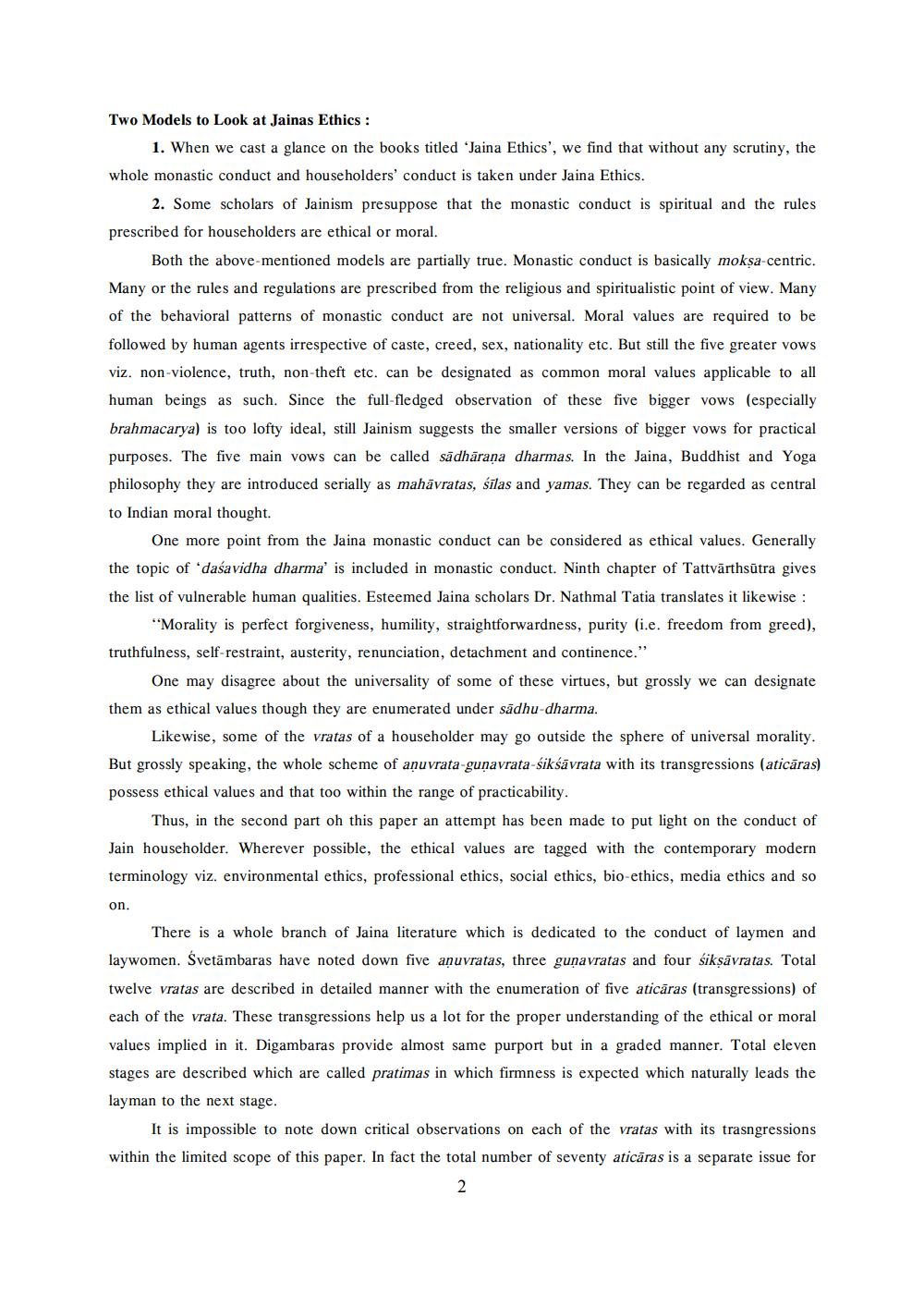Book Title: Etical Values Reflected in Jain Philosophy Author(s): Nalini Joshi Publisher: Nalini Joshi View full book textPage 2
________________ Two Models to Look at Jainas Ethics : 1. When we cast a glance on the books titled 'Jaina Ethics', we find that without any scrutiny, the whole monastic conduct and householders' conduct is taken under Jaina Ethics. 2. Some scholars of Jainism presuppose that the monastic conduct is spiritual and the rules prescribed for householders are ethical or moral. Both the above-mentioned models are partially true. Monastic conduct is basically mokṣa-centric. Many or the rules and regulations are prescribed from the religious and spiritualistic point of view. Many of the behavioral patterns of monastic conduct are not universal. Moral values are required to be followed by human agents irrespective of caste, creed, sex, nationality etc. But still the five greater vows viz. non-violence, truth, non-theft etc. can be designated as common moral values applicable to all human beings as such. Since the full-fledged observation of these five bigger vows (especially brahmacarya) is too lofty ideal, still Jainism suggests the smaller versions of bigger vows for practical purposes. The five main vows can be called sadharaṇa dharmas. In the Jaina, Buddhist and Yoga philosophy they are introduced serially as mahāvratas, śīlas and yamas. They can be regarded as central to Indian moral thought. One more point from the Jaina monastic conduct can be considered as ethical values. Generally the topic of 'daśavidha dharma' is included in monastic conduct. Ninth chapter of Tattvärthsūtra gives the list of vulnerable human qualities. Esteemed Jaina scholars Dr. Nathmal Tatia translates it likewise : "Morality is perfect forgiveness, humility, straightforwardness, purity (i.e. freedom from greed), truthfulness, self-restraint, austerity, renunciation, detachment and continence." One may disagree about the universality of some of these virtues, but grossly we can designate them as ethical values though they are enumerated under sädhu-dharma. Likewise, some of the vratas of a householder may go outside the sphere of universal morality. But grossly speaking, the whole scheme of aṇuvrata-gunavrata siksavrata with its transgressions (aticāras) possess ethical values and that too within the range of practicability. Thus, in the second part oh this paper an attempt has been made to put light on the conduct of Jain householder. Wherever possible, the ethical values are tagged with the contemporary modern terminology viz. environmental ethics, professional ethics, social ethics, bio-ethics, media ethics and so on. There is a whole branch of Jaina literature which is dedicated to the conduct of laymen and laywomen. Śvetämbaras have noted down five aṇuvratas, three gunavratas and four sikṣāvratas. Total twelve vratas are described in detailed manner with the enumeration of five aticāras (transgressions) of each of the vrata. These transgressions help us a lot for the proper understanding of the ethical or moral values implied in it. Digambaras provide almost same purport but in a graded manner. Total eleven stages are described which are called pratimas in which firmness is expected which naturally leads the layman to the next stage. It is impossible to note down critical observations on each of the vratas with its trasngressions within the limited scope of this paper. In fact the total number of seventy aticāras is a separate issue for 2Page Navigation
1 2 3 4 5 6
